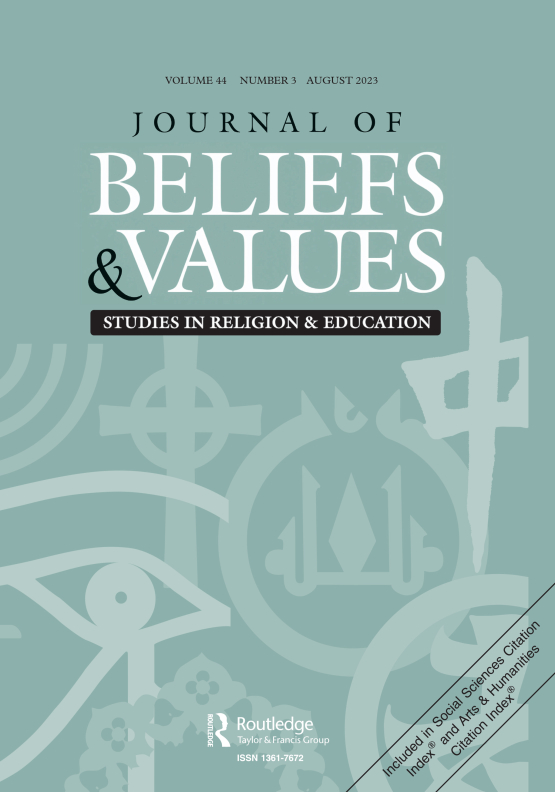Submit a Manuscript to the Journal
Journal of Beliefs & Values
For a Special Issue on
Localities and Regions in Religions and Worldviews Education
Abstract deadline
30 June 2023
Manuscript deadline
31 October 2024

Special Issue Editor(s)
Nigel Fancourt,
Department of Education, University of Oxford, UK
[email protected]
Stephen Parker,
The Centre for Catholic Education, Research and Religious Literacy (CERRL), St Mary's University, UK
[email protected]
Localities and Regions in Religions and Worldviews Education
Religious education policy and practice in many countries is not only determined by the state or the school but by or in response to an intermediate context. This special issue of the Journal of Beliefs and Values seeks to explore how religions and worldview education is (or has previously) been determined/shaped and adapted in relation to locality or region. The call is timely at it is roughly a century since the publication of the first locally agreed syllabuses in England, the West Riding of Yorkshire in 1922, then Cambridgeshire in 1924. Indeed, locally agreed syllabuses from 1944 became the statutory mechanism for determining the religious education curriculum in England (Fancourt 2022), thus becoming the vehicle for the subject’s definition and content historically and over time (Parker & Freathy 2011; 2012). Moreover, in response to wider cultural and educational change this legal, locally negotiated framework became the locus for, and facilitated, new developments in the subject, such as the introduction of ‘world religions’ and Humanist perspectives (Watson 2010).
Likewise, other countries have regional structures for the subject. For instance, the different Länder in Germany each determine its own form of the subject, and respond differently to particular local differences (Euchner 2018). The region of Alsace-Lorraine in France, which maintains a confessional selective model, unlike the laic model of the rest of France (Demissy 2009), is both a historical anomaly, but also a policy alternative. In Indonesia, the contexts of different islands and regions are relevant, so that Islamic education can be different in predominantly Hindu Bali to the rest of the islands (Saihu & Sarnoto 2020). Further, confessional models of religious education are often organised regionally, e.g., through church dioceses. These variations in the nature of religious education at a local level around the globe raise theoretical questions, about framing of the subject at the micro, meso and macro- levels (e.g., Berglund et al. 2016), and about the relationship between central government and local need. In the English context, it begs questions about the necessity of a central determinacy of the subject, recently recommended by the Commission on Religious Education. Comparisons across national jurisdictions through the lens of the local e.g., Franken’s (2020) study of Flanders in Belgium and Quebec in Canada have the potential to reveal interesting things about the dynamics of curriculum formation, amongst other things.
These localisms and regionalisms are unusual in the context of the wider curriculum; for instance, Mathematics education does not vary in this manner. They mark one of the subject’s distinguishing features.
This special issue will be launched with an online conference planned for 23 November 2023. This will be an opportunity to share initial ideas and plans for the papers collaboratively. We invite contributions that could include, but are not limited to:
- Explorations of the relationship between central (national government, national church/faith community) arrangements and the local;
- General policy or curricular analysis exploring and/or comparing different local or regional approaches;
- Historical accounts of the origins or local or regional differences, or seminal or forgotten episodes;
- Critique and critical analysis of local or regional structures, including their merits and disadvantages, as opposed to national or school determined models;
- Theoretical studies or evidence-based pieces which put the case for potentially different local/regional arrangements, or arguments for a more centralised determination;
- Teachers’, pupils’ or other stakeholders’ views of local or regional aspects of the subject.
Looking to Publish your Research?
Find out how to publish your research open access with Taylor & Francis Group.
Choose open accessSubmission Instructions
30 June 2023: Send an initial abstract of 500 words to [email protected]
23 November 2023: Online conference to share and discuss initial plans.
30 April 2024: deadline for submission of first draft. Selecting "Localities and Regions in Religions” when submitting your paper via the Submission Portal
31 July 2024: deadline for peer review feedback
August – October 2024: period for redrafting and further review
31 October 2024: Final deadline for inclusion
Early 2025: Online publication